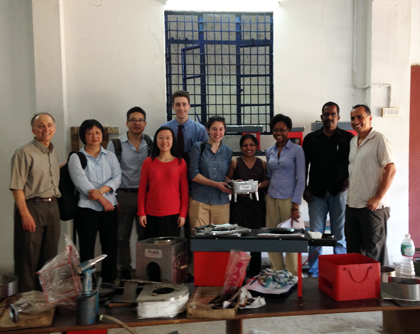For the world’s lowest-income people, cooking a day’s meals can be a tedious – even dangerous – job. According to the Global Alliance for Clean Cookstoves, exposure to smoke from traditional cooking practices causes four million premature deaths a year, primarily among women and children. As well, women and girls in low-income households often spend many hours collecting fuel and preparing meals.
Prakti Design, a South Indian social enterprise, has come up with a way to address this problem. The organization has produced a line of household and institutional cooking stoves that reduce fuel consumption by 80 per cent, virtually eliminate indoor air pollution and cut down cooking time by 70 per cent – compared with traditional three-stone fires – by using biomass fuels made from wood, charcoal and briquettes.
However, the stoves have not caught on as quickly as the organization had hoped. So earlier this year, Prakti invited a group of students and professors from U of T’s Global Innovation Group to help it address challenges related to the distribution and adoption of its stoves.
In India, the U of T students conducted interviews with a variety of stakeholders, including, memorably, women who complained about having to collect wood – a task that keeps them occupied for many hours a week. “They all erupted and started shouting,” says Hayden Rodenkirchen, a third-year student in international relations. “All that our translator could say was, ‘They really, really hate it!’”
In its final report, the group noted that the price of the stoves is still too high for most low-income families In India. The team also found that potential users don’t value the stove’s health benefits; maintenance and repair are concerns; and greater attention needs to be paid to the overall cooking experience. The group is planning further research to address these challenges.
Recent Posts
U of T’s 197th Birthday Quiz
Test your knowledge of all things U of T in honour of the university’s 197th anniversary on March 15!
Are Cold Plunges Good for You?
Research suggests they are, in three ways
Work Has Changed. So Have the Qualities of Good Leadership
Rapid shifts in everything from technology to employee expectations are pressuring leaders to constantly adapt





